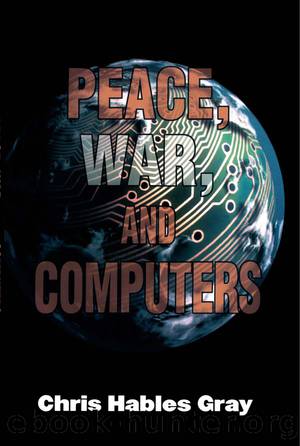Peace, War and Computers by Gray Chris Hables;

Author:Gray, Chris Hables;
Language: eng
Format: epub
ISBN: 1487192
Publisher: Taylor & Francis Group
ONE WORLD/ONE NET
If any one thing symbolizes and instantiates our global civilization, it is the Net. Many have argued that the Net, in and of itself, leads to democratization, and some have even put their money where their mouth is. The most famous of these is the strange anticapitalist billionaire George Soros. His Open Society Foundation has spent billions hooking up the universities of the old Soviet Empire to the Internet and fostering cyber cafes across Eastern Europe in the hope that this would strengthen democracy.
The idea that the Net is automatically democratic (cyberdemocracy) is being challenged by the increasing attempts to tame it, as in the fight over control of ICANN and other Internet institutions. Advocates of democracy, such as the Civil Society Democracy Project, are struggling with corporate and government players who want to remove any public input from the managing of the Internet.7
The main players in the struggle over the political and technical future of the Internet can be broken down into four categories: governments, corporations, alliances, and individuals.
Among governments, the United States is preeminent. If anyone could have been said to âownâ the Internet, it was the United States. Ironically, its ability to act has been severely constrained by the desires of other national governments to free the Internet from theoretical U.S. control. The Net has become semiautonomous, self-regulating, and âthe world's largest functioning anarchy,â but corporations, states, and alliances of them both continue to try to control at least part of the Web, with varying degrees of success. The U.S. government, however, has been forced to give up most of its formal power.
First, it tried to pass on administrative control to a number of for-profit corporations. However, the competition between corporations for guaranteed profits (notice the alliance against Microsoft), and the opposition by governments, alliances, and individuals to granting such monopolies, have precluded any permanent for-profit administration. Instead, because of the competition among those who would prefer a more structured and policed Internet, the governments and the corporations, much technical power remains with the voluntary alliances of computer professionals (including many of the key working committees that set Web standards) and others who have played major roles in making the Internet what it is today.
The political articulation of the liberatory potential of the Internet preceded the actual computer-human system. Often, it came from the voice of those who work with computers. There are many interlocking and overlapping groups that involve computerists, but one of the best is Computer Professionals for Social Responsibility (CPSR), which I have belonged to for many years.
CPSR grew out of organized opposition to the Strategic Defense Initiative (Star Wars) among computer scientists, but now it takes up many other issues as well, such as privacy, computer voting machines, computers and work, computers and gender, and the role of the Internet in society. CPSR's Internet principles can be seen in their âOne planet, one Netâ initiative:
There is only one Net.
The Net must be open and available to all.
People have the right to communicate.
Download
This site does not store any files on its server. We only index and link to content provided by other sites. Please contact the content providers to delete copyright contents if any and email us, we'll remove relevant links or contents immediately.
| Anthropology | Archaeology |
| Philosophy | Politics & Government |
| Social Sciences | Sociology |
| Women's Studies |
The Secret History by Donna Tartt(18250)
The Social Justice Warrior Handbook by Lisa De Pasquale(11965)
Thirteen Reasons Why by Jay Asher(8483)
This Is How You Lose Her by Junot Diaz(6466)
Weapons of Math Destruction by Cathy O'Neil(5865)
Zero to One by Peter Thiel(5513)
Beartown by Fredrik Backman(5375)
The Myth of the Strong Leader by Archie Brown(5252)
The Fire Next Time by James Baldwin(5035)
How Democracies Die by Steven Levitsky & Daniel Ziblatt(4973)
Promise Me, Dad by Joe Biden(4916)
Stone's Rules by Roger Stone(4876)
100 Deadly Skills by Clint Emerson(4705)
A Higher Loyalty: Truth, Lies, and Leadership by James Comey(4569)
Rise and Kill First by Ronen Bergman(4555)
Secrecy World by Jake Bernstein(4412)
The David Icke Guide to the Global Conspiracy (and how to end it) by David Icke(4403)
The Farm by Tom Rob Smith(4335)
The Doomsday Machine by Daniel Ellsberg(4255)
